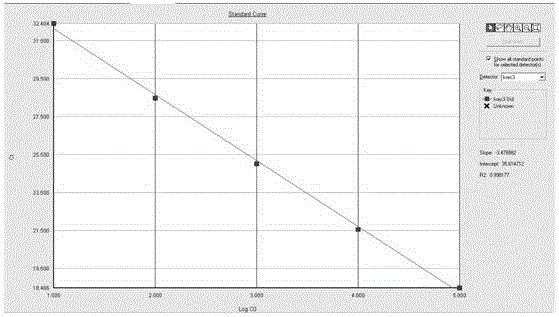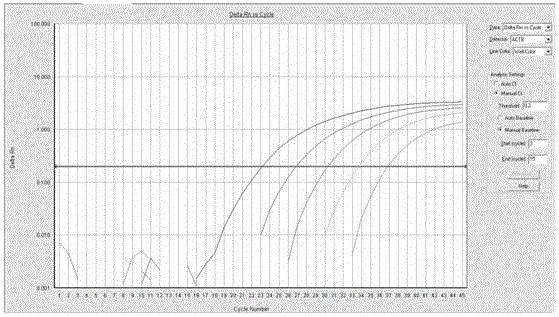Real-time fluorescent quantitative PCR (polymerase chain reaction) kit for one-step quantitative detection of KRECs gene and its application
A real-time fluorescence quantitative and real-time fluorescence technology, which is used in the determination/inspection of microorganisms, biochemical equipment and methods, etc., can solve the problem of high probability of missing critical positive samples, and reduce the occurrence of false negative results. High specificity and stable sample properties
- Summary
- Abstract
- Description
- Claims
- Application Information
AI Technical Summary
Problems solved by technology
Method used
Image
Examples
Embodiment 1
[0040] Embodiment 1: the preparation of kit
[0041] 1. Design and synthesis of primers and probes
[0042] According to the UCSCHumanGeneSorter query KRECs and β-actin gene sequences on the UCSC website (http: / / genome.ucsc.edu / cgi-bin / hgNear), use Primer3.0 to design fluorescent quantitative PCR upstream and downstream primers on KRECs and β-actin genes and probes. The selected primers have good specificity for gene binding and high PCR amplification efficiency. Both primers and probes were commissioned to LifeTechnologies to synthesize, where primers were purified by PAGE, and probes were purified by HPLC. The 5' end of the KRECs probe is a VIC fluorescent group, and the 3' end is a TAMRA fluorescent group; the 5' end of the β-actin probe is a VIC fluorescent group, and the 3' end is a TAMRA fluorescent group. Primer sequences are listed in Table 1.
[0043] Table 1 Insertion gene, specific primer and probe sequence
[0044]
[0045] 2. Construction of KRECs and β-ac...
Embodiment 2
[0060] Embodiment 2: the use of kit
[0061] 1. Extraction of DNA from dried blood filter paper of the sample to be tested
[0062] The operation steps are as follows:
[0063] A. Put three pieces of dried blood filter paper of the sample to be tested with a diameter of 3 mm obtained by punching holes into a sterilized 1.5 ml centrifuge tube, and add 180 μl of cell lysate 1.
[0064] B. Incubate at 85°C for 10 minutes. Gently flick the droplet from the cap into the tube.
[0065] C. Add 20 μl proteinase K stock solution, pipette slowly with a pipette tip, and incubate at 56°C for 1 hour. Gently flick the droplet from the cap into the tube.
[0066] D. Add 200 μl of cell lysate 2, slowly pipette with a pipette tip to mix thoroughly, and incubate at 70°C for 10 minutes. Gently flick the droplet from the cap into the tube.
[0067] E. Add 200 μl of absolute ethanol, and slowly pipette with the pipette tip to mix thoroughly. Gently flick the droplet from the cap into the tu...
PUM
 Login to View More
Login to View More Abstract
Description
Claims
Application Information
 Login to View More
Login to View More - R&D
- Intellectual Property
- Life Sciences
- Materials
- Tech Scout
- Unparalleled Data Quality
- Higher Quality Content
- 60% Fewer Hallucinations
Browse by: Latest US Patents, China's latest patents, Technical Efficacy Thesaurus, Application Domain, Technology Topic, Popular Technical Reports.
© 2025 PatSnap. All rights reserved.Legal|Privacy policy|Modern Slavery Act Transparency Statement|Sitemap|About US| Contact US: help@patsnap.com



